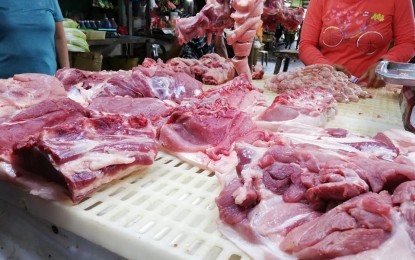
ASF WATCH. Pork meat is sold at the Tacloban public market in this photo taken on Jan. 18, 2021. The city government has stepped up measures to guard the city’s borders against the spread of African swine fever after the Department of Agriculture confirmed the first cases of the virus in three towns in Leyte. (PNA photo by Sarwell Meniano)
TACLOBAN CITY – The local government is stepping up measures to guard the city’s borders against the spread of African swine fever (ASF) after the Department of Agriculture (DA) confirmed the first cases of the virus in three towns in Leyte province.
City Veterinarian Eunice Alcantara said in an interview on Wednesday that border checkpoints set up for the coronavirus disease 2019 (Covid-19) are being used to tighten the watch against the entry of live hogs and pork products to the city.
“Even before the pronouncement of (the) DA, we have (been) strict on documentary requirements in the transport of all swine and pork meat in the city. We just have to be more proactive this time,” she told reporters.
On March 12, 2020, Mayor Alfred Romualdez issued an executive order regulating the entry of hogs and pork products.
The directive bans the entry of products from Luzon and regulates shipment from Mindanao and the Visayas.
“But due to ASF cases in three towns in Leyte, we just depend on supplies from backyard raisers in this city and some nearby towns. If the situation will get worse, we can only sustain the pork demand of the city in the next one to two months,” Alcantara added.
The city is highly dependent on pork meat supplies from Mindanao. Its abattoir slaughters 80 to 90 pigs daily during normal days.
Citing the latest inventory, she said the city has only 5,000 heads of swine raised in backyards, not enough to meet the meat requirement of its population of more than 250,000.
“We expect the price of pork meat in the city to go up, but we still have other options, such as chicken and fish,” Alcantara said.
On January 14, the DA confirmed the first case of ASF in the Visayas region in Abuyog town in Leyte, forcing authorities to cull 519 hogs within a 500-meter radius.
The culled pigs were from the villages of Can-aporong, San Isidro, Bunga, Canmarating, Buenavista, and Loyonsawang in Abuyog.
Placed under strict surveillance are 38 villages in Abuyog, nine in MacArthur town, and three in Javier town, but more areas will be under monitoring as the ASF affects more villages outside Abuyog.
The agriculture department announced on Tuesday that confirmatory tests showed that blood samples taken from five villages from the nearby towns of Javier and La Paz in Leyte, were positive of the ASF virus.
This was confirmed by the Bureau of Animal Industry’s Animal Disease Diagnosis and Reference Laboratory.
New cases were found in Mag-aso and Luneta villages in La Paz; and Comatin, Caranhug, and Abuyogay in Javier.
Initial investigation showed that the ASF virus could have been transmitted to local farms through infected boar being used for natural mating and hog traders who may have fed their stocks with contaminated food products.
Pigs affected by ASF usually manifest high fever, distinct reddish areas on the skin of the neck, chest, and extremities, and bleeding of internal organs that could lead to death within two to 10 days. (PNA)
